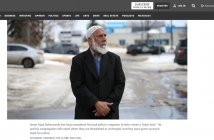Cornies: Saudi allies also breed the terror we are fighting against

Imam Syed Soharwardy
Canada’s relationship with Saudi Arabia has long been a complicated and, at times, contradictory one.
Canada overlooks that country’s human-rights abuses against women and those who oppose powerful Muslim clerics; Saudi Arabia allows us an entree into their economy, the biggest in the Middle East. We agree to sell military equipment to them; they maintain a relatively neutral stance on the existence of Israel while opposing the regime in Iran. We align ourselves with the United States on a number of international issues; they continue to guarantee stable oil supplies.
It’s been a situation that has required Canadian politicians and diplomats to frequently suspend moral judgments and highly principled foreign policy.
While Canada’s population (35.7 million) is greater than that of Saudi Arabia (27.4 million), there exists an enormous mismatch in terms of wealth and geopolitical influence. And so Ottawa’s approach to bilateral relationships has been one of pragmatism.
“The Conservatives pride themselves on having a principled foreign policy, and in some cases that’s true and in other cases it’s not,” Thomas Juneau, a former analyst for Canada’s Defence Department told the CBC last month. “Saudi Arabia is one of the cases where principle is completely trumped by pragmatism. The pragmatism in our relationship with Saudi Arabia is the trade argument . . . and the partnership with a country that’s aligned with some of — not all, but some of — our geopolitical interests.”
And the centrepiece of that pragmatism, Juneau said, is the $15-billion deal between the two countries for armoured vehicles.
When that deal was unveiled at the General Dynamics Land Systems plant in London a year ago, International Trade Minister Ed Fast called it the biggest contract of its kind that Canada had ever signed. “We know we can compete with the very best in the world and win,” he said, in an oblique reference to competitors in France and Germany.
Company officials and industry analysts hailed the development as a step toward putting Canada at the forefront of the global armoured-vehicle business, and estimated the deal would create 3,000 jobs in London and at suppliers across the country.
All of that, of course, occurred in the days before extremist groups such as al Shabaab, Boko Haram and ISIS were making near-daily headlines. It occurred before the Canadian Parliament became more seriously interested in the process by which young Canadian men (and, to a lesser degree, women) were being radicalized at home to fight battles both here and abroad. It occurred before Parliament came under attack. Before Warrant Officer Patrice Vincent. Before Cpl. Nathan Cirillo.
Earlier this month, Calgary imam Syed Soharwardy appeared before the Senate’s committee on national defence to sketch out the contradictions between Canada’s efforts to disrupt radicalization and its ongoing trade relationships with Saudi Arabia.
“My faith has been hijacked,” Soharwardy said, “and my country, Canada, is facing threat.”
“There are people preaching open intolerance in this country, and the government is doing nothing; the government isn’t going after them,” he said. “The problem is that the government has a very close ally, and that is Saudi Arabia. Saudi Arabia is part of the G20. It is a very close ally of the United States and Canada . . . but Saudi Arabia is the breeding ground of that ideology that creates a terrorist.”
The extent to which Saudi charities, royalty and diplomats finance activity overseas is not completely understood in either Canada or the United States. But pressure is mounting in the American Congress to have President Barack Obama declassify 28 pages of a congressional report about the 9/11 attacks, pages that deal with foreign financial support for 19 hijackers. President George W. Bush ordered that section of the report heavily censored; Obama sealed it. Now, more than a decade on, many Americans want to know what it says.
Canada’s relationship with Saudi Arabia is no longer just about trade and political alliances, no longer just about oil and Israel. It is increasingly becoming enmeshed in the issues of radicalization, the foreign influences that come to bear on Canada’s national security, and even Ottawa’s new anti-terrorism legislation.
And that, for the thousands of workers at General Dynamics’ sprawling Oxford St. plant and its suppliers, is becoming an increasingly inconvenient truth.
Larry Cornies is a London-based journalist and educator. cornies@gmail.com




